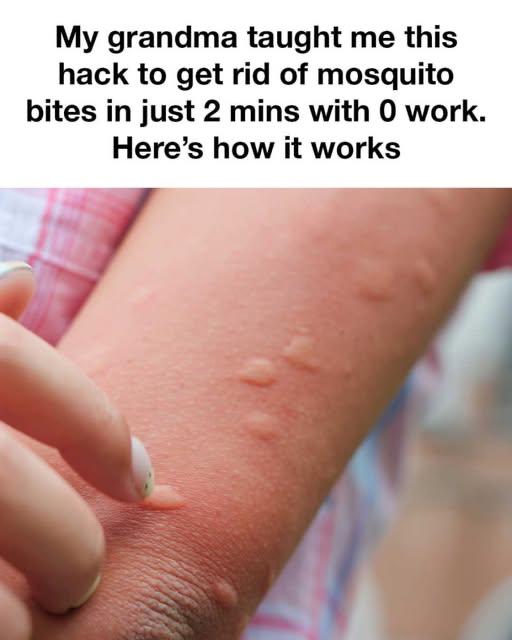Summer is back, and with it comes the all-too-familiar annoyance of itchy mosquito bites. As temperatures rise, so does the number of people turning to social media in search of quick fixes to stop the itch. One particularly popular method that’s been making the rounds is the “hot spoon” trick, which some TikTok users are touting as a miracle solution. But while it might seem like a clever, harmless hack, medical professionals are urging caution, saying this method could do more harm than good.

Before diving into whether or not the hot spoon method really works, it’s worth understanding why mosquito bites cause such a reaction in the first place. According to the Mayo Clinic, it’s the female mosquitoes that are doing all the biting — and it’s not just because they’re hungry. Female mosquitoes need the protein in human blood to produce their eggs. So in a sense, every time you get bitten, you’re unknowingly helping mosquitoes reproduce.
As they feed, mosquitoes inject saliva into your skin. This saliva triggers an immune response in your body, which is what causes the familiar red bump and maddening itch. The body releases histamines as part of this response, which inflames the area and makes you feel that irresistible urge to scratch. And anyone who’s suffered through a summer evening outside knows how relentless that itch can be — enough to make you willing to try just about anything for a little relief.
Enter the hot spoon method. It’s trending on TikTok and across social media platforms as a supposed quick-fix to stop mosquito bites from itching. The process is fairly simple: heat a metal spoon in hot water for about 30 seconds, then press it directly onto the bite for a few seconds. According to many users, the heat works to instantly neutralize the itching sensation. One popular TikTok video demonstrating this method has racked up over 2.6 million views, with the creator claiming, “I can help you get rid of bug bites in less than a minute. All you need is a cup, a spoon, and a little bit of water.”
@peaceful_nik_the_medium How to heal a mosquito bite in one minute! #bugs #mosquito #mosquitobites #naturalhealing #PerfectPrideMovement #guidance #bugbites ♬ Say So (Instrumental Version) [Originally Performed by Doja Cat] – Elliot Van Coup
On the surface, it might sound like a magic trick. And surprisingly, there’s a bit of science that supports the logic behind it. Heat, when applied to the skin, can serve as a form of counter-stimulation. Essentially, it provides a different sensory input that competes with the sensation of itching. Dr. Calvin Williams, a board-certified dermatologist and medical director of Essential Dermatology Group in Texas, likens it to a parent kissing a child’s scraped knee — it doesn’t actually treat the injury, but it makes it feel a little better.
Dr. Williams explained in an interview that “heat provides counter-stimulation which can distract the nerve cells from transmitting the itch signal.” So yes, pressing a hot spoon on a bite might reduce the sensation — but it’s not curing the underlying reaction. And unfortunately, any relief is usually short-lived. It might last a few minutes, maybe a couple of hours, but the itch is likely to return.
Still, just because something has a bit of scientific merit doesn’t mean it’s safe. Dermatologists are unanimous in warning people against using hot metal objects on their skin. Dr. Kevin Wang, a dermatologist at Stanford and physician at the VA Palo Alto Medical Center, cautions that this method carries a high risk of burns. “It’s not something I or my colleagues routinely recommend for itching,” he said. “There are far more effective medicines and methods for itching.”
His biggest concern? Safety. “Most people aren’t going to take the temperature of how hot their hot water is before applying it to their skin,” Dr. Wang explained. “You are more likely to get burned by it. You risk causing a first-degree burn or worse, and that’s why I don’t recommend it.” It’s easy to underestimate how hot a metal spoon can get, and an accidental burn could lead to pain, blistering, or even infection.
So what should you do instead when a mosquito bite drives you crazy? Thankfully, there are several at-home remedies that are both safe and effective. First, try applying a cold compress or ice pack to the area. This helps reduce inflammation and provides a soothing effect. Use it for up to 10 minutes at a time for best results.
Topical treatments are also widely recommended. Over-the-counter creams like hydrocortisone or calamine lotion can ease itching and reduce redness. These are especially helpful if you have multiple bites or particularly sensitive skin. If your reaction is more severe, oral antihistamines such as Allegra or Zyrtec can help calm your body’s allergic response, easing both swelling and itch.
If you’re someone who prefers natural alternatives, there are still options. A simple paste made from baking soda and water can be applied directly to the bite. It’s a classic remedy that works by neutralizing the skin’s pH and reducing irritation. Another natural option is taking a bath with colloidal oatmeal, which has long been used to treat itchy, inflamed skin. It’s especially soothing for children or those with sensitive skin.
Ultimately, while the hot spoon method might look tempting and has even shown some short-term effectiveness, experts agree it’s not worth the risk. The potential for burns or skin damage far outweighs the brief relief it may offer. Instead, stick with tried-and-true methods that offer both safety and comfort.
So the next time a mosquito turns you into its personal buffet, skip the hot spoon and grab an ice pack, a tube of anti-itch cream, or mix up a simple baking soda paste. Your skin will thank you for it. And if you have a secret itch-relief trick of your own, we’d love to hear it. Share your favorite remedy — and be sure to spread the word so others can stay safe and itch-free this summer.





